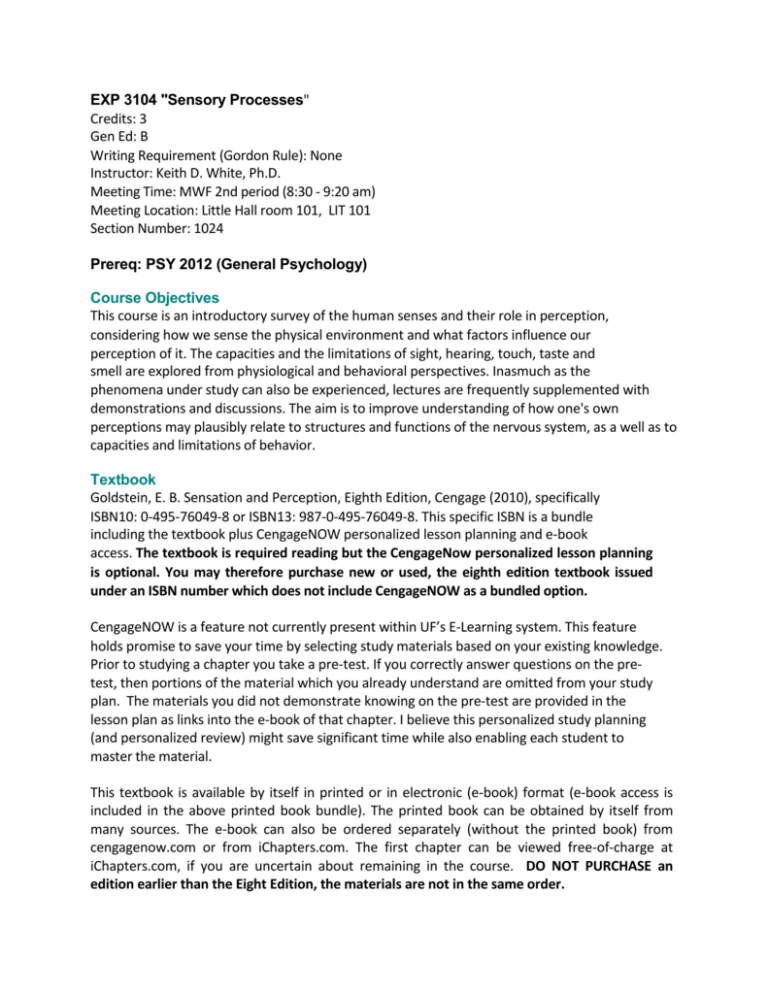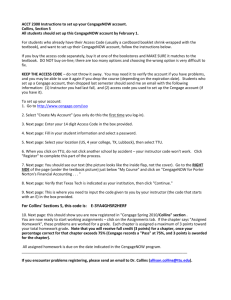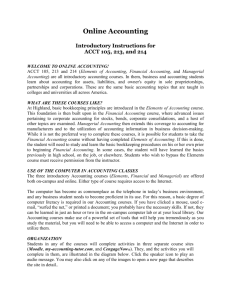EXP 3104 "Sensory Processes" Credits: 3 Gen Ed: B Writing
advertisement

EXP 3104 "Sensory Processes" Credits: 3 Gen Ed: B Writing Requirement (Gordon Rule): None Instructor: Keith D. White, Ph.D. Meeting Time: MWF 2nd period (8:30 - 9:20 am) Meeting Location: Little Hall room 101, LIT 101 Section Number: 1024 Prereq: PSY 2012 (General Psychology) Course Objectives This course is an introductory survey of the human senses and their role in perception, considering how we sense the physical environment and what factors influence our perception of it. The capacities and the limitations of sight, hearing, touch, taste and smell are explored from physiological and behavioral perspectives. Inasmuch as the phenomena under study can also be experienced, lectures are frequently supplemented with demonstrations and discussions. The aim is to improve understanding of how one's own perceptions may plausibly relate to structures and functions of the nervous system, as a well as to capacities and limitations of behavior. Textbook Goldstein, E. B. Sensation and Perception, Eighth Edition, Cengage (2010), specifically ISBN10: 0-495-76049-8 or ISBN13: 987-0-495-76049-8. This specific ISBN is a bundle including the textbook plus CengageNOW personalized lesson planning and e-book access. The textbook is required reading but the CengageNow personalized lesson planning is optional. You may therefore purchase new or used, the eighth edition textbook issued under an ISBN number which does not include CengageNOW as a bundled option. CengageNOW is a feature not currently present within UF’s E-Learning system. This feature holds promise to save your time by selecting study materials based on your existing knowledge. Prior to studying a chapter you take a pre-test. If you correctly answer questions on the pretest, then portions of the material which you already understand are omitted from your study plan. The materials you did not demonstrate knowing on the pre-test are provided in the lesson plan as links into the e-book of that chapter. I believe this personalized study planning (and personalized review) might save significant time while also enabling each student to master the material. This textbook is available by itself in printed or in electronic (e-book) format (e-book access is included in the above printed book bundle). The printed book can be obtained by itself from many sources. The e-book can also be ordered separately (without the printed book) from cengagenow.com or from iChapters.com. The first chapter can be viewed free-of-charge at iChapters.com, if you are uncertain about remaining in the course. DO NOT PURCHASE an edition earlier than the Eight Edition, the materials are not in the same order. Online Materials Lecture notes, study guides, this syllabus, quizzes and tests will be on the UF E-Learning system for online access. Because E-Learning recently moved to a new software system (Sakai), technical problems might arise. I strongly suggest that you work on E-Learning during the operating hours of the UF computing Help Desk. Personalized lesson planning and e-book access (CengageNOW, optional) use the textbook publisher’s web site (cengagenow.com). You register on the CengageNOW web site using (1) your email address, (2) Course/Section Key contact Dr. White, plus (3) an access code purchased with your textbook IF you purchased the bundle designated ISBN10: 0-495-76049-8. You can, if you wish, purchase CengageNOW access directly from the web site if you did not purchase a bundle having the access code. Topical Outline and Calendar of Assignments EXP 3104 "Sensory Processes”: Fall 2013 Date Assignment Topic 8/21 - 8/26 Chapter 1 Introduction to Perception 8/28 Appendix Signal Detection, Procedure and Theory 8/30 - 9/06 Chapter 2 Introduction to the Physiology of Perception 9/02 Labor Day, no classes 9/09 QUIZ 1 - Chapters 1 & 2 and Appendix, 32 questions in 40 minutes (e-Learning) 9/09 - 9/13 Chapter 3 Introduction to Vision 9/16 - 9/23 Chapter 4 The Visual Cortex and Beyond 9/25 QUIZ 2 - Chapters 3 & 4, 32 questions in 40 minutes (e-Learning) 9/25 - 9/27 Chapter 5 Perceiving Objects and Scenes 9/30 - 10/02 Chapter 6 Visual Attention 10/04 - 10/07 Chapter 7 Taking Action 10/09 QUIZ 3 - Chapters 5 - 7, 32 questions in 40 minutes (e-Learning) 10/09 - 10/11 Chapter 8 Perceiving Motion 10/14 - 10/18 Chapter 9 Perceiving Color 10/21 - 10/25 Chapter 10 Perceiving Depth and Size 10/28 QUIZ 4 - Chapters 8 - 10, 32 questions in 40 minutes (e-Learning) 10/28 - 11/01 Chapter 11 Sound, the Auditory System, and Pitch Perception 11/04 - 11/06 Chapter 12 Sound Localization and the Auditory Scene 11/08 Homecoming, no classes 11/11 Veterans’ Day, no classes 11/13 - 11/18 Chapter 13 Speech Perception 11/20 QUIZ 5 - Chapters 11 - 13, 32 questions in 40 minutes (e-Learning) 11/20 - 11/22 Chapter 14 The Cutaneous Senses 11/25 - 12/02 Chapter 15 The Chemical Senses 11/27 - 11/29 Thanksgiving, no classes 12/02 - 12/04 Chapter 16 Perceptual Development 12/12 (Thursday) CUMULATIVE FINAL EXAM, 80 questions in 100 minutes, 4 or 5 questions per chapter, ch. 1 – 13 & Appendix, 8 questions per chapter, ch. 14 – 16 e-Learning: Begin on the date shown after 8:00 am and submit by 10:00 pm. Once begun you will have 1.25 minutes allotted per multiple-choice question Methods by which students will be evaluated and their grade determined Evaluations will include five eLearning-based QUIZZES , each covering about 1/6th of the course, and a cumulative FINAL EXAM over all of the course materials, with extra questions on the last sixth of the material not previously on a QUIZ.. The total on the five QUIZZES (160 questions) contributes 2/3 toward course grade, and the FINAL EXAM (80 questions) contributes 1/3 of the course grade. Quiz and final exam questions will be multiple choice items . Scale for grades is approximately [>90%]=A, [89% to 80%]=B, [79% to 70%]=C, etc. If the distribution of total course scores appears to warrant it, then at my discretion I may adjust the exact cutoff values for a grade range to favor the students (i.e., a lower score than 90% might earn an A). I will not raise the cutoff values. I award pluses to an upper part of each grade range, determined at my discretion but typically about the top 1/3 of the range. I award minuses to a low part of each grade range, determined at my discretion but typically about the bottom 1/3 of each grade range. UF Academic Honesty Policy UF's Academic Honesty Policy is clearly stated in rule 6Cl-4.0l7 Student Affairs: Academic Honesty Guidelines . Class Attendance Policy You will not be specifically penalized for missing class other than by failing to hear and learn from the lecture and by failing to observe or to participate in demonstrations or discussions. It is not our responsibility to provide materials from lectures other than in the scheduled lectures. Powerpoint presentations will be available on the web. Class Conduct Policy Using a cell phone during class, late arrival to class, or early departure from class are all usually distracting and should be avoided whenever possible. If an emergency cell phone call must be responded to, please excuse yourself from class to attend to it. Class discussions or conversations need to stay on track (not be monopolized by a personal agenda), and require listening to others’ ideas as well as responding to others in an appropriate manner using appropriate language (civil, respectful conduct). Policy for makeup exams If you have a schedule conflict known in advance, please inform me well before the quiz/test/final exam date to arrange for a makeup on a different date. Because only the best quiz score counts, makeups for quizzes are not usually offered except by prior arrangement. Emergencies are considered on a case-by-case basis. Accommodations for students with disabilities If you require accommodations due to a disability, UF policy states that "Students requesting classroom accommodation must first register with the Dean of Students Office. The Dean of Students Office will provide documentation to the student who must then provide this documentation to the Instructor when requesting accommodation." Please make an appointment during my office hours so that we may discuss how best to address your needs. How to contact Dr. White or the TA The most reliable way to contact me is by email: kdwhite@ufl.edu . My office is room 005K PSY, located in the basement of the Psychology building. Phone: 273-2143 (office and voice mail), 392-7985 (fax), or 375-6373 (home). Voice mail or an answering machine at home will pick up after the fourth ring. Wendy Yoder, the teaching assistant, can be reached by email wendyyoder@ufl.edu Keith White is an Associate Professor of Psychology with joint/affiliate appointments in Clinical and Health Psychology, Electrical and Computer Engineering, the McKnight Brain Institute, and Ophthalmology. He is a Research Scientist and Associate Coordinator of the Brain Function Measurement Core in the Brain Rehabilitation Research Center at the NF/SG VA Medical Center. His sensory research concerns vision and visual perceptions, and altered visual perceptions in individuals with neurologic or psychiatric disorders. He also does neuroimaging research, primarily functional magnetic resonance imaging (fMRI) and white matter tractography using high-angular resolution diffusion-weighted imaging . His neuroimaging research studies normal aging, as well as rehabilitation of aphasia and limb movements in stroke patients, studies of Alzheimer’s and Parkinson’s diseases and other neurodegenerative diseases, and Gulf War syndrome. He is also studying vestibulo-ocular reflexes in autistic children, and the influence of mild traumatic brain injury on postural stability. Office hours Dr. White: MWF 3rd 005K PSY or by appointment (kdwhite@ufl.edu) Wendy Yoder, teaching assistant: W 1:00 – 3:00 pm PSY 330 or by appointment wendyyoder@ufl.edu




